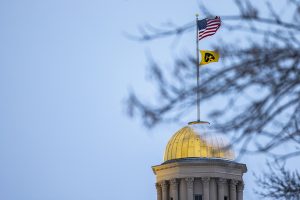Legislators entertain possibility of financial literacy requirement
High school students in Iowa may be required to take a financial literacy course according to a newly proposed bill.
The Iowa State Capitol is shown on Tuesday, Jan. 13, 2015.
January 25, 2019
Iowa legislators have filed a bill that, should it pass, will require public-school students statewide to learn how to responsibly manage their money.
In the past, legislators have attempted to implement a financial-literacy requirement in public schools, which would demand that students learn in the classroom how to manage their money prior to high-school graduation. However, the bill was continually filed without coming to fruition until the most recent proposed legislation, Senate Study Bill 1029.
RELATED: Banzai, 10,000 years of financial life
Sen. Jeff Danielson, D-Waterloo, said the current bill differs from its predecessors in that it requires one-half unit of a financial-literacy course, beginning with the freshman class of 2022-23.
“On the original bill, there was no date for when it would begin, and there were upperclassmen who would not have been able to finish the requirement,” Danielson said. “This way, schools have a chance to get it implemented.”
He emphasized that the new bill is not really new. While it suggests implementing the financial-literacy course later than the earlier proposals, its goal of educating students on money management remains the same.
“We don’t always have a perfect bill when we have a new idea,” Danielson said. “The purpose is to make sure that high-school students leave with some exposure to everyday finances.”
Because other states have also considered a financial-literacy requirement, or offered similar courses to students, he doesn’t consider the bill unique to Iowa.
“I think schools will be supportive,” Danielson said. “Those who helped craft the original bill were actually teachers who were elected as senators and representatives, so they’re aware of what that means for the classroom. We see it as a positive win-win.”
The chair of the state Senate Education Committee filed Senate Study Bill 1029, which Danielson usually indicates a matter of priority. Once the subcommittee — comprising Danielson and two Republican senators who serve on the Education Committee — meets, it will go to a floor vote.
In addition to Danielson, the subcommittee members are Sen. Amy Sinclair, R-Allerton, and Sen. Jeff Edler, R-State Center. The subcommittee will meet on Jan. 28.
“This bill that’s been introduced is really easy, because it doesn’t do anything but change implementation,” Sinclair said. “Students should become financially literate adults so they’re not in massive amounts of debt.”
She said the primary purpose of this bill was to add a financial-literacy requirement without impeding the schedules of upperclassmen who are near completion of their required courses for graduation.
The need for the course itself seems self-explanatory, Sinclair said. University of Iowa Pappajohn Entrepreneurial Center Lecturer Bob Walker agreed, saying that a required course early on in people’s education could prepare them financially for different life stages.
“In Iowa, you can have a job at 14 years old,” Walker said. “If you look at compounding interests and the power of that, you could literally have a few years of retirement savings by the time you’re 25.”
He believes it’s a parental and professional responsibility to students to teach them about managing their money, he said. For example, he said, the conversation surrounding student debt could be cleared up if students were required to take a financial-literacy course.
As of the 2016-17 academic year, average debt for UI undergraduates ranged from $25,599 for resident students to $32,908 for nonresidents, according to a April 2018 report by the state Board of Regents.
“Financial literacy is really knowing where you want to go and how to get there,” Walker said. “We give you all this information on how to be successful, but we don’t teach you how to be financially [sound] and be responsible.”







